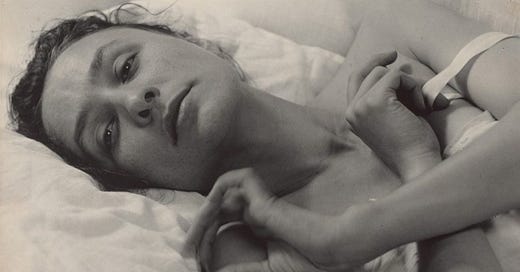Ways of Seeing
The pandemic has distorted my sense of self, so I asked some friends if they felt beautiful. Here's what they said.
Georgia O’Keeffe by Alfred Stieglitz, 1918.
One evening, a good friend of mine asked me what seemed like a simple enough question: Do you feel beautiful? I had a small meltdown trying to answer it. Yes. But also, no. I mean, I know that I am. Because I am confident and secure. Still, I feel as though there are many days where I don’t feel beautiful, so, no. I wanted to be confident, certain in answering. Instead I vacillated between a self-defeating kind of logic and a needy vulnerability. The only way I felt comfortable proceeding was by beginning with the idea that of course I believed I was beautiful because on some deeper level, beauty comes from within, and I must count myself in this. Yet, at the same time, I feel a tremendous amount pressure to be someone I’m not; I feel like my whole life, and all of society, has made it an impossible task not to compare myself to unrealistic ideals that I’ll never live up to. So yes? But also no? But deep down, yes.
I decided to ask a few of my friends the same question. Below is how they answered. (I let them reply however they felt best.)
Carina del Valle Schorske, writer:
A feeling is a passing thing, like beauty, but today I have it—I washed my hair last night, so there’s still some wave, and I’m wearing a beloved button-up with a Bob Marley print that my friend Raju gave me to remember him by when he left the city. It has a nice drape and helps balance my proportions—my figure is probably my best feature, but my torso’s too skinny for the thickness of my thighs. Gold hoops, of course. A stretchy miniskirt. Often, the first thing I’m noticed for, in motion, is the wiggle in my walk (tumbao), which is a comfort to me, because I imagine it won’t age quickly, and there’s nothing to buy to preserve or promote it.
The pandemic has made me insecure—not only because I’m so rarely seen (and so, validated) but because the mask puts the focus on my eyes, which I’ve always worried are not eyes to love: they’re smallish, dark, hooded, and down-turned, Slavic like my grandfather’s or indigenous like my grandmother’s sister, who they called Chinita in Puerto Rico. Eyeliner slides off, disappears when I blink, so I rarely wear it. And yet I can’t help the frankness in my gaze. The volatility.
In the senior superlatives at my mostly white, private high school I was voted “sexually confident” alongside my best friend, a striking, full-figured Chicana who also lived in an apartment with her single mother. Neither of us had much experience to speak of. Now I think that superlative was trying to tell us we held ourselves in higher erotic self-regard than we ought to given our deviations from the suburban millennial ideal.
There’s this idea that beauty should be unknowing, or at least equal to the attention it demands. I know I violate this balance somehow—that I possess an audacity that makes me charismatic to some people and grotesque to others. I guess I have a desire to be seen that goes beyond the desire to be found beautiful. Maybe this is why I find myself doing less than I might to enhance my appearance: I don’t want to set a punishing precedent for myself, I don’t want my beauty to be the condition of my visibility.
“Hands” by Alfred Stieglitz, 1919.
Adrian Danchig-Waring, dancer:
I’ve spent much of my life staring into mirrors making corrections to my line. My identity branches from this critical faculty. Mostly what I see is a lean body in perpetual need of more length. For example, the thickest parts of me, my thighs, get rotisserie’d outward to obscure their bulk. I’ve mastered such illusions, and so I’ve found success in the ballet. What I sculpt in the mirror becomes monumental onstage and, until this year, those efforts are applauded by an audience. It’s in those moments—steaming, sweating, bowing before the golden curtain—that I feel most beautiful. Sometimes I even feel my most free, most pure, most exhilarating self. I bathe in the illusion night after night—and it’s enough to coax me out of bed, and through the pain, to recommit myself tomorrow.
Now I spend a lot more time on video chat. I do not find this exhilarating. In fact, I think it’s aging me, dulling me, ruining me by decontextualizing my face from the more cultivated parts of my person. So, I go back to the studio to work, and there I see all the pieces pulled together in harmony—from toe tip to finger tip to crown. I don’t necessarily like what I see, but that’s not the point (and besides, I’m uniquely conditioned to find the flaws). The point is that in this pursuit I once again feel like myself: purposeful, powerful, and arcing towards the impossible. There’s no audience tonight, tomorrow, or the day after that, but in this solitary work I reclaim my meaning. Within this fleeting, fluid dance I find moments of unbearable beauty.
Jiayang Fan, writer:
I would say yes and no. There are fleeting moments in which the happiness feels like a kind of beauty that I can wear. But in these covid times, I mostly feel brittle and desiccated. And that is as much a commentary on my mental state as it is on my skin!
Laila Gohar, artist:
I do sometimes. Not always. (It helps when I’m tan.)
P.S. Next week, Hawaiian butter cake and vanilla extract. And do feel free to write and tell me what you think of the question. I am curious!






